【2025年中考英语一轮教材复习课件】 七年级(上) Unit 3【通用版】
文档属性
| 名称 | 【2025年中考英语一轮教材复习课件】 七年级(上) Unit 3【通用版】 |  | |
| 格式 | pptx | ||
| 文件大小 | 986.2KB | ||
| 资源类型 | 试卷 | ||
| 版本资源 | 通用版 | ||
| 科目 | 英语 | ||
| 更新时间 | 2024-12-15 15:52:44 | ||
图片预览


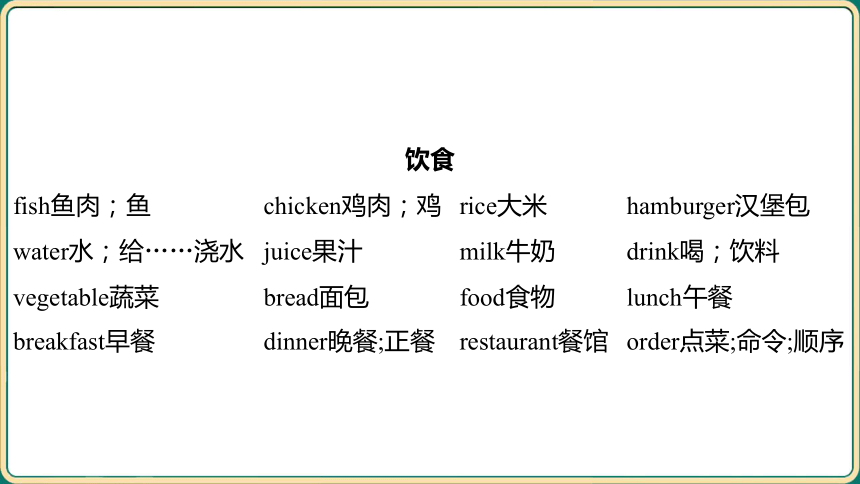
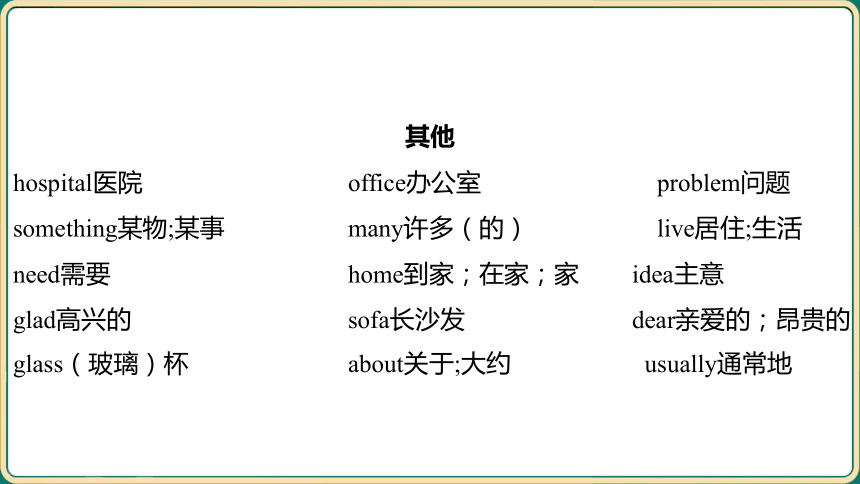

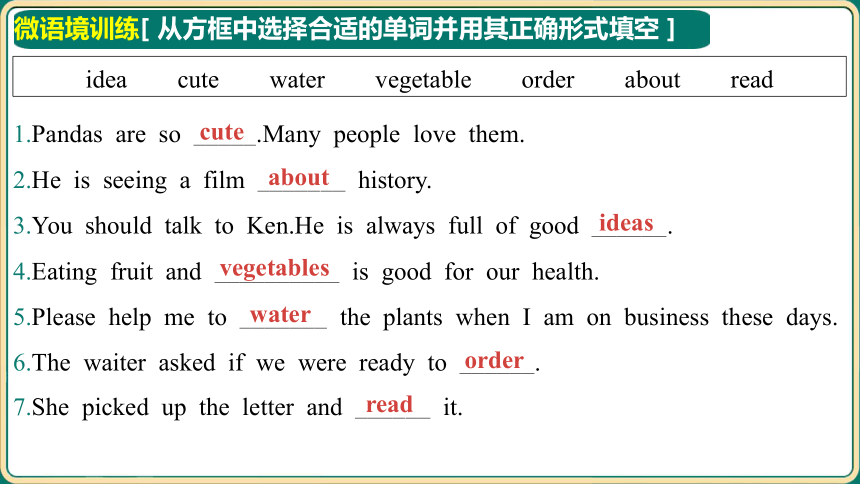
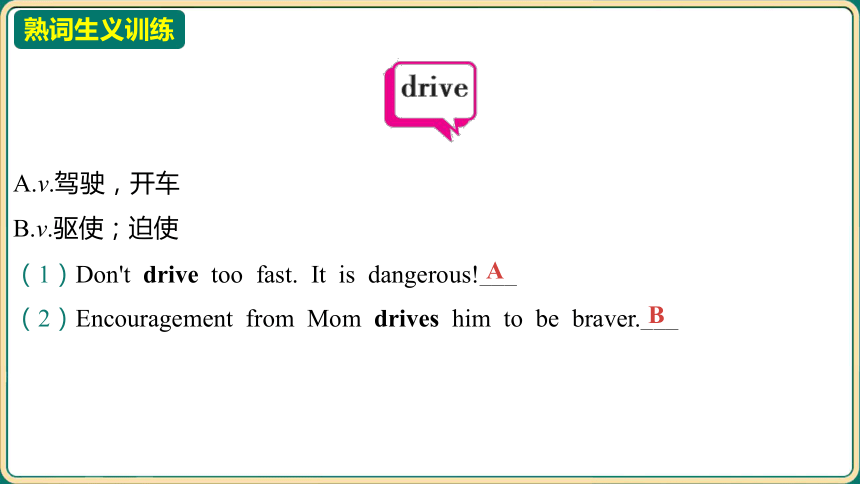
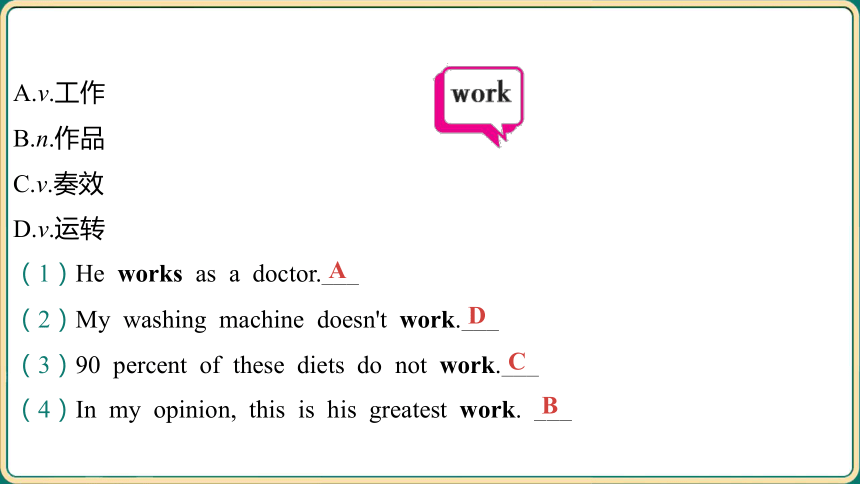
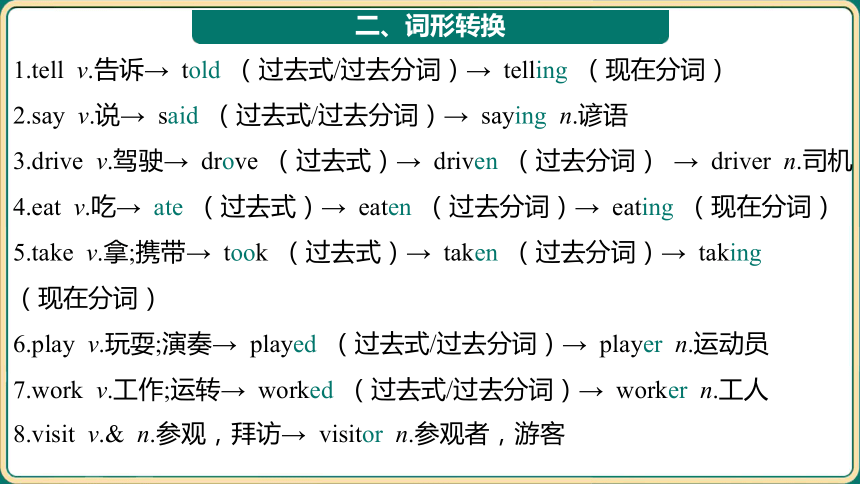
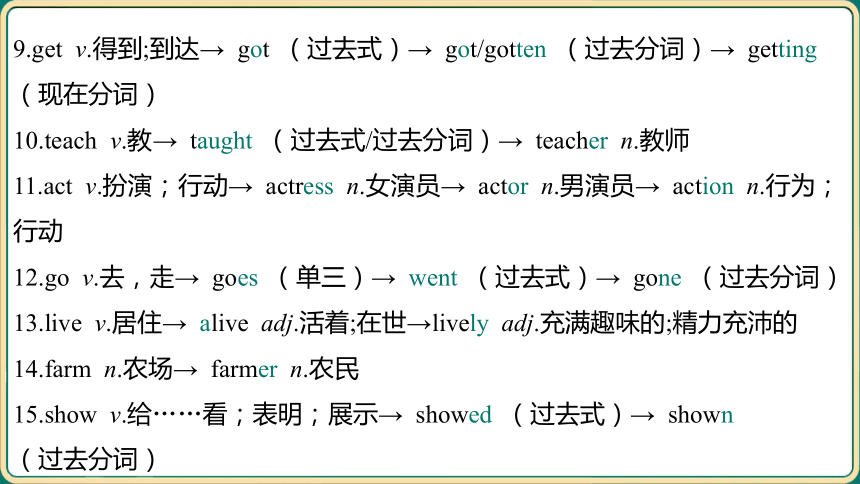
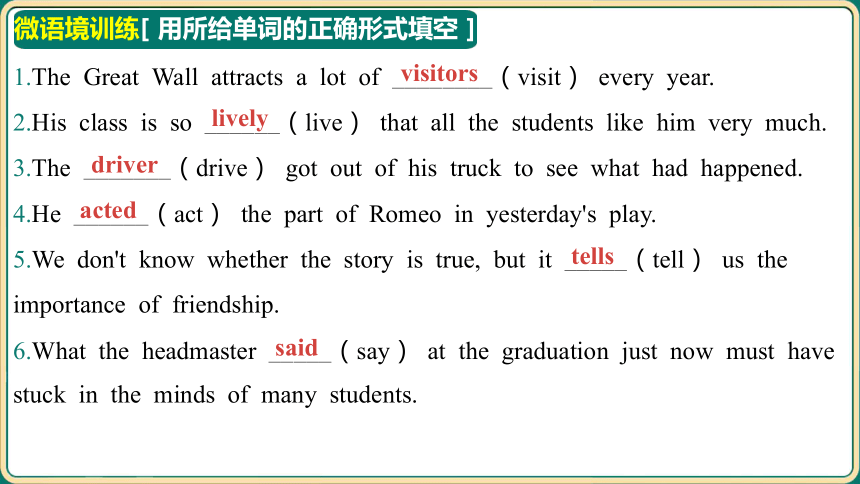
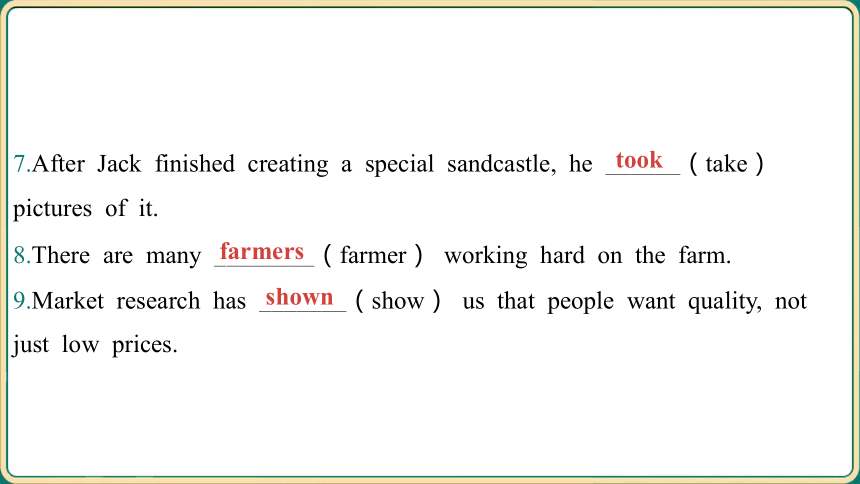
文档简介
(共52张PPT)
福建中考英语教材基础过关
2025年中考英语一轮教材复习
七年级(上) Unit 3
一、重点单词
称谓
mother母亲 father父亲 parent父(母)亲
grandparent(外)祖父(母) daughter女儿 son儿子
sister姐,妹 brother兄,弟 kid小孩;开玩笑
uncle叔,伯,姨父 aunt婶母,姑母,姨母
cousin堂(表)兄弟(姐妹)
nurse护士 doctor医生 cook厨师;烹调
people人;人们
饮食
fish鱼肉;鱼 chicken鸡肉;鸡 rice大米 hamburger汉堡包
water水;给……浇水 juice果汁 milk牛奶 drink喝;饮料
vegetable蔬菜 bread面包 food食物 lunch午餐
breakfast早餐 dinner晚餐;正餐 restaurant餐馆 order点菜;命令;顺序
其他
hospital医院 office办公室 problem问题
something某物;某事 many许多(的) live居住;生活
need需要 home到家;在家;家 idea主意
glad高兴的 sofa长沙发 dear亲爱的;昂贵的
glass(玻璃)杯 about关于;大约 usually通常地
there在那里 often经常 some一些
cute可爱的;机灵的 with关于;具有;和;用 tree树
love爱;喜爱 sure当然;确信的
kind友好的;种,类
well很好地;充分地;好吧,那么;健康的;良好的
read读,朗读
微语境训练
[从方框中选择合适的单词并用其正确形式填空]
idea cute water vegetable order about read
1.Pandas are so _____.Many people love them.
2.He is seeing a film _______ history.
3.You should talk to Ken.He is always full of good ______.
4.Eating fruit and __________ is good for our health.
5.Please help me to _______ the plants when I am on business these days.
6.The waiter asked if we were ready to ______.
7.She picked up the letter and ______ it.
cute
about
ideas
vegetables
water
order
read
熟词生义训练
A.v.驾驶,开车
B.v.驱使;迫使
(1)Don't drive too fast. It is dangerous!___
(2)Encouragement from Mom drives him to be braver.___
A
B
A.v.工作
B.n.作品
C.v.奏效
D.v.运转
(1)He works as a doctor.___
(2)My washing machine doesn't work.___
(3)90 percent of these diets do not work.___
(4)In my opinion, this is his greatest work. ___
A
D
C
B
二、词形转换
1.tell v.告诉→ told (过去式/过去分词)→ telling (现在分词)
2.say v.说→ said (过去式/过去分词)→ saying n.谚语
3.drive v.驾驶→ drove (过去式)→ driven (过去分词) → driver n.司机
4.eat v.吃→ ate (过去式)→ eaten (过去分词)→ eating (现在分词)
5.take v.拿;携带→ took (过去式)→ taken (过去分词)→ taking
(现在分词)
6.play v.玩耍;演奏→ played (过去式/过去分词)→ player n.运动员
7.work v.工作;运转→ worked (过去式/过去分词)→ worker n.工人
8.visit v.& n.参观,拜访→ visitor n.参观者,游客
9.get v.得到;到达→ got (过去式)→ got/gotten (过去分词)→ getting
(现在分词)
10.teach v.教→ taught (过去式/过去分词)→ teacher n.教师
11.act v.扮演;行动→ actress n.女演员→ actor n.男演员→ action n.行为;
行动
12.go v.去,走→ goes (单三)→ went (过去式)→ gone (过去分词)
13.live v.居住→ alive adj.活着;在世→lively adj.充满趣味的;精力充沛的
14.farm n.农场→ farmer n.农民
15.show v.给……看;表明;展示→ showed (过去式)→ shown
(过去分词)
微语境训练
[用所给单词的正确形式填空]
1.The Great Wall attracts a lot of ________(visit) every year.
2.His class is so ______(live) that all the students like him very much.
3.The _______(drive) got out of his truck to see what had happened.
4.He ______(act) the part of Romeo in yesterday's play.
5.We don't know whether the story is true, but it _____(tell) us the
importance of friendship.
6.What the headmaster _____(say) at the graduation just now must have
stuck in the minds of many students.
visitors
lively
driver
acted
tells
said
7.After Jack finished creating a special sandcastle, he ______(take)
pictures of it.
8.There are many ________(farmer) working hard on the farm.
9.Market research has _______(show) us that people want quality, not
just low prices.
took
farmers
shown
三、必备短语
1.a lot (of)许多 2.a little一点儿 3.each other互相,彼此
4.not…at all一点儿也不,根本不 5.family tree家谱 6.look forward to盼望
7.every day每天 8.eat out下馆子 9.be kind to sb.对某人友善
微语境训练
[从上面选择合适的短语并用其正确形式填空]
1.Modern research has found that plants do communicate with ___________.
2.She is _____ afraid of the dark _______.
3.If you ____________ others, it can encourage them to pass on the
kindness.
4.I'm ___________________ hearing from you.
each other
not
at all
are kind to
looking forward to
四、重点句型
语法点睛
1.He wants to visit Beijing.他想去参观北京。
2.—Does he speak Chinese 他讲中文吗?
—Yes, he does./No, he doesn't.是的,他讲。/不,他不讲。
3.—What does your father do 你的父亲是干什么的?
—He is a cook.他是一名厨师。
4.—Where do you/they work 你/你们/他们在哪里工作?
—I/We/They work on a farm.我/我们/他们在农场工作。
写作积累
1.Many students in our class like English a lot, but I like it a little.我们班
里的很多同学都非常喜欢英语,而我只是有点喜欢。
2.Maria shows a photo of her family to Kangkang.玛丽亚给康康展示了一张
她的全家福。
3.I'm very glad to be here.我很高兴来到这里。
五、功能表达
询问个人信息
1.—Excuse me, could you please tell me your name 打扰了,请问你能告诉
我你的名字吗?
—Sure. My name is Jane.当然。我的名字是简。
请求帮助
2.—Could you help me with it 你能帮我处理它吗?
—No problem.没问题。
询问个人喜好
3.—Do you like Chinese 你喜欢中文吗?
—Yes, I like it very much/a lot/a little./No, I don't like it at all.是的,我非
常/有点喜欢它。/不,我一点都不喜欢它。
问候
4.—Glad to meet you.很高兴见到你。
—Glad to meet you, too.也很高兴见到你。
谈论职业
5.—What does your mother do 你的母亲是做什么的?
—She's a nurse.她是一名护士。
谈论饮食习惯
6.—What do you usually have for breakfast 你早餐通常吃什么?
—I usually have milk and bread for breakfast.我通常早餐喝牛奶和吃面包。
点餐
7.—May I take your order, sir 先生,你可以点餐了吗?
—Fish with vegetables and rice, please.请给我鱼肉配蔬菜和米饭。
8.—Would you like something to drink 你想要点喝的吗?
—Yes, a glass of apple juice, please./No, thanks.是的,请给我一杯苹果汁。
/不了,谢谢。
9.—What would you like to eat 你想吃什么?
—Let me see./I'd like some chicken.让我看看。/我想要一些鸡肉。
10.—Why not have some fish and eggs 为什么不吃一些鱼肉和鸡蛋呢?
—Good idea.好主意。
11.Help yourself/yourselves(to some fish).请你(们)随便吃点(鱼肉)。
12.Milk for me, please.请给我牛奶。
情景交际训练
1.你想知道Jack妈妈的职业,可以这样问他:
___________________________, Jack
What does your mother do
2.同桌问你能否帮他学习数学,你可以这样肯定回答:
____________.
3.餐厅服务员想问你现在是否点餐,他会这样说:
_______________________
No problem
May I take your order
重难点1 play
She likes to play with Kitty.她喜欢和基蒂一起玩。
提分特训
1.love _____________________________________
He loves playing ping-pong/table tennis.
2.last Sunday ______________________________
They played chess last Sunday.
3.—What's that noise, Tom
—Oh, some children ___ in the yard.
B
A.play B.are playing C.will play
4.I am sorry I didn't answer your phone because I was playing ___ piano
at that time.
C
A./ B.a C.the
5.A sports player can learn a lot when he or she plays ___ better players.
B
A.for B.against C.except
重难点2 take, bring, get, carry与fetch
May I take your order, sir 先生,您可以点菜了吗?
词汇 用法
take 带走,拿走(从说话人处带到别处)
take…to…把……带到……
take…away把……带走
词汇 用法
bring 带来,拿来(从别处带到说话人处)
bring sb.sth.=bring sth.to sb.把某物带给某人
get 去取,去拿(到别处把某物带来)
get sb.sth.=get sth.for sb.给某人取来某物
carry 携带,搬,载运
fetch (去)拿来
漫画助记
提分特训
用take, bring, get或carry的适当形式填空
John lived in a quiet village.He loved singing and his beautiful songs
6._________ pleasure to people there.The village was short of water, so the
villagers had to walk miles every day to 7.____ water.It was sunny there
most of the time, so John was used to 8._______ a straw hat with him
when he went out.In the village, the ox was used to help in the field and
9.______ heavy goods.
brought
get
taking
carry
重难点3 well, fine与good
Li Xiang's pen pal can speak Chinese very well.李想的笔友中文说
得很好。
词汇 用法 well adj. 指身体好,不能作定语
adv. 作状语,多放在所修饰的动词后
fine adj. 指人,意为“身体健康的” 指物,意为“高质量的,美好的” 指天气,意为“晴朗的” good adj. 表示人或物好的普通用语
提分特训
10.你想说“早起是一个很好的习惯”,你可以这样说:
It's ____________________________.
a good habit to get up early
11.同学生病了,你可以这样安慰他:
Don't worry.______________________.
You will be well soon
12.Sunday, if ______________________________________________________
They are going to have a picnic if it is fine this Sunday.
重难点4 would like
I would like an egg and some fish.我想要一个鸡蛋和一些鱼肉。
结构 含义
would like 要,想要(相当于want, 但语气比want委婉)
would like to do sth. 想要做某事
would like sb.to do sth. 想要某人做某事
归纳拓展
Would you like (to do)... 表示“你想要(做)……吗 ”,用来礼貌地
询问对方的意愿,常见答语:Yes, please./Yes, I'd love/like to.../No, thanks.
提分特训
13.This movie is so wonderful that I'd like ___ it a second time.
A
A.to watch B.watching C.watch
14.你想邀请朋友参加你的生日聚会,可以这样说:
Would you _________________________________?
like to come to my birthday party
15.你想知道朋友想喝什么,可以这样问他:
_____________________________?
What would you like to drink
重难点5 Why not do...
Why not have some fish and eggs 为什么不吃一些鱼肉和鸡蛋呢?
Why not do… =Why don't you/we do… 意为“你(们)/我们为什么不
做……呢?”,表示商量或给予对方建议,否定式疑问句显得更加委婉。
常见答语:Good idea./All right./OK.
提分特训
16.朋友英语口语不好,你想对他说“为什么不去英语角练习呢?”,你可以这
样说:
__________________________________________________________?
Why not/Why don't you go to the English Corner to practice
17.你想建议大家休息一下,你可以这样说:
Why don't _______________?
we have a rest
语法点1 一般现在时
(1)结构
①主语+be动词(am/is/are)+其他.
②主语+实义动词(原形/单三形式)+其他.
(2)意义
①表示现在的状态。
②表示经常的或习惯性的动作。
③表示特征或能力。
④表示客观存在或普遍真理。
(3)标志词
常见标志词有often,on weekends,every day等。
提分特训
1.—When is the Space Day of China
—It ___ on April 24 every year.
A
A.falls B.fell C.will fall
2.—Safety is very important to all of us.
—I agree.We students should learn ___ ourselves in the daily life.
C
A.where to hold B.what to visit C.how to protect
3.As we all know, modesty(谦虚) ___ one to make progress.
B
A.helped B.helps C.will help
语法点2 不可数名词
不可数名词一般没有复数形式,不能与a/an或表示具体数量的词直接连用。
不可数名词前可用some, any, no, a little等限定词修饰,若要表示具体
的数量,可用“glass, piece等名词+of”结构。如:
some milk一些牛奶
three glasses of juice三杯果汁
提分特训
4.—I'm thirsty.I'd like a glass of orange juice.What about you, Betty
—I prefer a cup of tea ___ nothing in it.
B
A.to B.with C.without
5.你听到美妙的音乐时可以这样感叹:
What _____________________!
wonderful music it is
基础练
Ⅰ.选择填空
1.[2024牡丹江中考改编] —Who cooked the hot dry noodles for you
They're delicious.
—Nobody.I learned to cook ___ by myself on the Internet.
A
A.them B.their C.theirs
2.[2024齐齐哈尔中考] —It's time to graduate.We should say “Thanks” to
our teachers.
—I think so.We have made great progress ___ the teachers' help.
A
A.with B.through C.under
3.Look! ___are eating over there.
B
A.Many chicken B.Many chickens C.A little chickens
4.—What is your mother, Susan
—She is a ___ and she takes care of many patients.
C
A.teacher B.manager C.nurse
5.[2024无锡中考] We're looking for ___ who can deal with the new
computer virus.
B
A.someone B.something C.everything
6.[2024广西中考] You should ___ your car slowly when passing by a
school.
A
A.drive B.clean C.repair
7.[2024扬州中考改编] —I hear you're leaving for Guilin for your holiday
—That's right.And I'm ___ it.
C
A.keeping away from B.catching up with C.looking forward to
8.[2024绥化中考改编] The flight was delayed (延误) because of the
storm, ___ the passengers had to wait at the airport.
A
A.so B.or C.for
9.When I was young, my parents taught me___ older people kindly.
C
A.treat B.treating C.to treat
10.[2024广西中考改编] Jimmy likes reading, so he often___ to the
bookstore to buy some books.
C
A.went B.will go C.goes
Ⅱ.情景交际
1.你想知道Peter的爸爸是做什么工作的,可以这样问:
__________________________, Peter
What does your father do
2.同学到你家来做客,你想招呼他吃点水果,你可以这样说:
___________________________, please.
Help yourself to some fruit
3.你想知道朋友早餐通常吃什么,可以这样问他:
_______________________________________
What do you usually have for breakfast
4.Harry问你是否可以帮他学习汉语,你表示没问题,可以这样说:
____________.
No problem
5.餐厅服务员想知道你是否可以点菜了,他会这样问:
_______________________
May I take your order
Ⅲ.看图写话
1.usually, walk _____________________________
______
The girl usually walks to school.
2.can, well ________________________________
____
She/The girl can play the violin well.
3.often, story ______________________________
___________________________________________
________________
The mother often tells stories to her children./The mother often tells her children stories.
4.uncle, work _____________________________
5.lunch, yesterday __________________________________________
My uncle works in a hospital.
I had chicken and rice for lunch yesterday.
提升练
Ⅳ.阅读理解
[2024甘肃白银中考]
I L O V E C H I N E S E !
David Brown is a 15-year-old boy from the UK.This summer he is studying
Chinese in a summer camp in Gansu Province.This is what he told our
interviewer.
What do you think of Gansu Well, I think it's fantastic.Summer is the best season to visit Gansu.I enjoy the pleasant weather a lot.Gansu also has many pretty views with a long history. Where are you staying in Gansu
I'm staying with some very nice
families in different cities in
Gansu.That's quite helpful in
learning Chinese and experiencing
the life and culture here.That's why
I've chosen homestay.
Is there anything else you especially like about it Yes, the friendly people and delicious foods. When we were in Tianshui City 3 days ago, we tried malatang, a traditional spicy hot pot dish.I like it a lot.Beef noodles and rangpizi are also my favorites.I haven't tried huidouzi.But it seems very tasty. Do you like learning Chinese
I enjoy learning Chinese because it's
interesting and has a rich
history.Chinese characters are
beautiful, and the language offers
many chances.Being able to speak
Chinese will be very helpful in the
future.I want to be a Chinese
teacher when I'm older.
1.What does David Brown do ( )
C
A.He is a British teacher. B.He is a tour guide.
C.He is an English student. D.He is an American teenager.
2.What food hasn't David tried in Gansu ( )
D
A.Beef noodles. B.Malatang. C.Rangpizi. D.Huidouzi.
3.How does David like Gansu ( )
A
A.He enjoys it a lot. B.He doesn't mind it.
C.He can't stand the weather. D.He hates it.
4.Why is David staying with the local families ( )
C
A.Because he has no other choices.
B.Because his parents ask him to do so.
C.Because it's helpful for language learning.
D.Because it's cheaper than staying in hotels.
5.What makes David want to be a Chinese teacher ( )
D
A.The enjoyment Chinese food brings.
B.Friendly Chinese people he met.
C.What the interviewer told him.
D.Many chances the language will bring.
Ⅴ.短文填空
[2024湖南中考改编] I work at a most popular restaurant in my
hometown.I love working here as a member of a fantastic team.People here
1.____(be) very friendly and hard-working.
I started by washing the dishes when I was only 18.I worked hard,
and soon became 2.___waiter.Simon, who was head chef(主厨)then,
began to show 3.____ (I) how to cook.I loved it so much and I
4.______ (go) to college to learn more.When Simon left the restaurant, I
became head chef.At the time all the food was traditional.The quality(品
质)was good, but I felt like 5._______(do) something different, so I
decided to have a different menu.
are
a
me
went
doing
Now we serve food from all over the country.There are many markets
and food shops here.I can 6.________ (usual) find any ingredient(配料)
I need.I use a lot of natural food.Some people think it is not so delicious,
7._____ I don't agree.Well-prepared natural food has a 8._______ (good)
taste than fast food.Our food is healthy and most customers love it.We use
the best meat and the freshest vegetables.At the weekend we play many
9.______ (kind) of music.There's also a special menu 10.____children on
Saturdays and that's when we serve traditional food.
usually
but
better
kinds
for
福建中考英语教材基础过关
2025年中考英语一轮教材复习
七年级(上) Unit 3
一、重点单词
称谓
mother母亲 father父亲 parent父(母)亲
grandparent(外)祖父(母) daughter女儿 son儿子
sister姐,妹 brother兄,弟 kid小孩;开玩笑
uncle叔,伯,姨父 aunt婶母,姑母,姨母
cousin堂(表)兄弟(姐妹)
nurse护士 doctor医生 cook厨师;烹调
people人;人们
饮食
fish鱼肉;鱼 chicken鸡肉;鸡 rice大米 hamburger汉堡包
water水;给……浇水 juice果汁 milk牛奶 drink喝;饮料
vegetable蔬菜 bread面包 food食物 lunch午餐
breakfast早餐 dinner晚餐;正餐 restaurant餐馆 order点菜;命令;顺序
其他
hospital医院 office办公室 problem问题
something某物;某事 many许多(的) live居住;生活
need需要 home到家;在家;家 idea主意
glad高兴的 sofa长沙发 dear亲爱的;昂贵的
glass(玻璃)杯 about关于;大约 usually通常地
there在那里 often经常 some一些
cute可爱的;机灵的 with关于;具有;和;用 tree树
love爱;喜爱 sure当然;确信的
kind友好的;种,类
well很好地;充分地;好吧,那么;健康的;良好的
read读,朗读
微语境训练
[从方框中选择合适的单词并用其正确形式填空]
idea cute water vegetable order about read
1.Pandas are so _____.Many people love them.
2.He is seeing a film _______ history.
3.You should talk to Ken.He is always full of good ______.
4.Eating fruit and __________ is good for our health.
5.Please help me to _______ the plants when I am on business these days.
6.The waiter asked if we were ready to ______.
7.She picked up the letter and ______ it.
cute
about
ideas
vegetables
water
order
read
熟词生义训练
A.v.驾驶,开车
B.v.驱使;迫使
(1)Don't drive too fast. It is dangerous!___
(2)Encouragement from Mom drives him to be braver.___
A
B
A.v.工作
B.n.作品
C.v.奏效
D.v.运转
(1)He works as a doctor.___
(2)My washing machine doesn't work.___
(3)90 percent of these diets do not work.___
(4)In my opinion, this is his greatest work. ___
A
D
C
B
二、词形转换
1.tell v.告诉→ told (过去式/过去分词)→ telling (现在分词)
2.say v.说→ said (过去式/过去分词)→ saying n.谚语
3.drive v.驾驶→ drove (过去式)→ driven (过去分词) → driver n.司机
4.eat v.吃→ ate (过去式)→ eaten (过去分词)→ eating (现在分词)
5.take v.拿;携带→ took (过去式)→ taken (过去分词)→ taking
(现在分词)
6.play v.玩耍;演奏→ played (过去式/过去分词)→ player n.运动员
7.work v.工作;运转→ worked (过去式/过去分词)→ worker n.工人
8.visit v.& n.参观,拜访→ visitor n.参观者,游客
9.get v.得到;到达→ got (过去式)→ got/gotten (过去分词)→ getting
(现在分词)
10.teach v.教→ taught (过去式/过去分词)→ teacher n.教师
11.act v.扮演;行动→ actress n.女演员→ actor n.男演员→ action n.行为;
行动
12.go v.去,走→ goes (单三)→ went (过去式)→ gone (过去分词)
13.live v.居住→ alive adj.活着;在世→lively adj.充满趣味的;精力充沛的
14.farm n.农场→ farmer n.农民
15.show v.给……看;表明;展示→ showed (过去式)→ shown
(过去分词)
微语境训练
[用所给单词的正确形式填空]
1.The Great Wall attracts a lot of ________(visit) every year.
2.His class is so ______(live) that all the students like him very much.
3.The _______(drive) got out of his truck to see what had happened.
4.He ______(act) the part of Romeo in yesterday's play.
5.We don't know whether the story is true, but it _____(tell) us the
importance of friendship.
6.What the headmaster _____(say) at the graduation just now must have
stuck in the minds of many students.
visitors
lively
driver
acted
tells
said
7.After Jack finished creating a special sandcastle, he ______(take)
pictures of it.
8.There are many ________(farmer) working hard on the farm.
9.Market research has _______(show) us that people want quality, not
just low prices.
took
farmers
shown
三、必备短语
1.a lot (of)许多 2.a little一点儿 3.each other互相,彼此
4.not…at all一点儿也不,根本不 5.family tree家谱 6.look forward to盼望
7.every day每天 8.eat out下馆子 9.be kind to sb.对某人友善
微语境训练
[从上面选择合适的短语并用其正确形式填空]
1.Modern research has found that plants do communicate with ___________.
2.She is _____ afraid of the dark _______.
3.If you ____________ others, it can encourage them to pass on the
kindness.
4.I'm ___________________ hearing from you.
each other
not
at all
are kind to
looking forward to
四、重点句型
语法点睛
1.He wants to visit Beijing.他想去参观北京。
2.—Does he speak Chinese 他讲中文吗?
—Yes, he does./No, he doesn't.是的,他讲。/不,他不讲。
3.—What does your father do 你的父亲是干什么的?
—He is a cook.他是一名厨师。
4.—Where do you/they work 你/你们/他们在哪里工作?
—I/We/They work on a farm.我/我们/他们在农场工作。
写作积累
1.Many students in our class like English a lot, but I like it a little.我们班
里的很多同学都非常喜欢英语,而我只是有点喜欢。
2.Maria shows a photo of her family to Kangkang.玛丽亚给康康展示了一张
她的全家福。
3.I'm very glad to be here.我很高兴来到这里。
五、功能表达
询问个人信息
1.—Excuse me, could you please tell me your name 打扰了,请问你能告诉
我你的名字吗?
—Sure. My name is Jane.当然。我的名字是简。
请求帮助
2.—Could you help me with it 你能帮我处理它吗?
—No problem.没问题。
询问个人喜好
3.—Do you like Chinese 你喜欢中文吗?
—Yes, I like it very much/a lot/a little./No, I don't like it at all.是的,我非
常/有点喜欢它。/不,我一点都不喜欢它。
问候
4.—Glad to meet you.很高兴见到你。
—Glad to meet you, too.也很高兴见到你。
谈论职业
5.—What does your mother do 你的母亲是做什么的?
—She's a nurse.她是一名护士。
谈论饮食习惯
6.—What do you usually have for breakfast 你早餐通常吃什么?
—I usually have milk and bread for breakfast.我通常早餐喝牛奶和吃面包。
点餐
7.—May I take your order, sir 先生,你可以点餐了吗?
—Fish with vegetables and rice, please.请给我鱼肉配蔬菜和米饭。
8.—Would you like something to drink 你想要点喝的吗?
—Yes, a glass of apple juice, please./No, thanks.是的,请给我一杯苹果汁。
/不了,谢谢。
9.—What would you like to eat 你想吃什么?
—Let me see./I'd like some chicken.让我看看。/我想要一些鸡肉。
10.—Why not have some fish and eggs 为什么不吃一些鱼肉和鸡蛋呢?
—Good idea.好主意。
11.Help yourself/yourselves(to some fish).请你(们)随便吃点(鱼肉)。
12.Milk for me, please.请给我牛奶。
情景交际训练
1.你想知道Jack妈妈的职业,可以这样问他:
___________________________, Jack
What does your mother do
2.同桌问你能否帮他学习数学,你可以这样肯定回答:
____________.
3.餐厅服务员想问你现在是否点餐,他会这样说:
_______________________
No problem
May I take your order
重难点1 play
She likes to play with Kitty.她喜欢和基蒂一起玩。
提分特训
1.love _____________________________________
He loves playing ping-pong/table tennis.
2.last Sunday ______________________________
They played chess last Sunday.
3.—What's that noise, Tom
—Oh, some children ___ in the yard.
B
A.play B.are playing C.will play
4.I am sorry I didn't answer your phone because I was playing ___ piano
at that time.
C
A./ B.a C.the
5.A sports player can learn a lot when he or she plays ___ better players.
B
A.for B.against C.except
重难点2 take, bring, get, carry与fetch
May I take your order, sir 先生,您可以点菜了吗?
词汇 用法
take 带走,拿走(从说话人处带到别处)
take…to…把……带到……
take…away把……带走
词汇 用法
bring 带来,拿来(从别处带到说话人处)
bring sb.sth.=bring sth.to sb.把某物带给某人
get 去取,去拿(到别处把某物带来)
get sb.sth.=get sth.for sb.给某人取来某物
carry 携带,搬,载运
fetch (去)拿来
漫画助记
提分特训
用take, bring, get或carry的适当形式填空
John lived in a quiet village.He loved singing and his beautiful songs
6._________ pleasure to people there.The village was short of water, so the
villagers had to walk miles every day to 7.____ water.It was sunny there
most of the time, so John was used to 8._______ a straw hat with him
when he went out.In the village, the ox was used to help in the field and
9.______ heavy goods.
brought
get
taking
carry
重难点3 well, fine与good
Li Xiang's pen pal can speak Chinese very well.李想的笔友中文说
得很好。
词汇 用法 well adj. 指身体好,不能作定语
adv. 作状语,多放在所修饰的动词后
fine adj. 指人,意为“身体健康的” 指物,意为“高质量的,美好的” 指天气,意为“晴朗的” good adj. 表示人或物好的普通用语
提分特训
10.你想说“早起是一个很好的习惯”,你可以这样说:
It's ____________________________.
a good habit to get up early
11.同学生病了,你可以这样安慰他:
Don't worry.______________________.
You will be well soon
12.Sunday, if ______________________________________________________
They are going to have a picnic if it is fine this Sunday.
重难点4 would like
I would like an egg and some fish.我想要一个鸡蛋和一些鱼肉。
结构 含义
would like 要,想要(相当于want, 但语气比want委婉)
would like to do sth. 想要做某事
would like sb.to do sth. 想要某人做某事
归纳拓展
Would you like (to do)... 表示“你想要(做)……吗 ”,用来礼貌地
询问对方的意愿,常见答语:Yes, please./Yes, I'd love/like to.../No, thanks.
提分特训
13.This movie is so wonderful that I'd like ___ it a second time.
A
A.to watch B.watching C.watch
14.你想邀请朋友参加你的生日聚会,可以这样说:
Would you _________________________________?
like to come to my birthday party
15.你想知道朋友想喝什么,可以这样问他:
_____________________________?
What would you like to drink
重难点5 Why not do...
Why not have some fish and eggs 为什么不吃一些鱼肉和鸡蛋呢?
Why not do… =Why don't you/we do… 意为“你(们)/我们为什么不
做……呢?”,表示商量或给予对方建议,否定式疑问句显得更加委婉。
常见答语:Good idea./All right./OK.
提分特训
16.朋友英语口语不好,你想对他说“为什么不去英语角练习呢?”,你可以这
样说:
__________________________________________________________?
Why not/Why don't you go to the English Corner to practice
17.你想建议大家休息一下,你可以这样说:
Why don't _______________?
we have a rest
语法点1 一般现在时
(1)结构
①主语+be动词(am/is/are)+其他.
②主语+实义动词(原形/单三形式)+其他.
(2)意义
①表示现在的状态。
②表示经常的或习惯性的动作。
③表示特征或能力。
④表示客观存在或普遍真理。
(3)标志词
常见标志词有often,on weekends,every day等。
提分特训
1.—When is the Space Day of China
—It ___ on April 24 every year.
A
A.falls B.fell C.will fall
2.—Safety is very important to all of us.
—I agree.We students should learn ___ ourselves in the daily life.
C
A.where to hold B.what to visit C.how to protect
3.As we all know, modesty(谦虚) ___ one to make progress.
B
A.helped B.helps C.will help
语法点2 不可数名词
不可数名词一般没有复数形式,不能与a/an或表示具体数量的词直接连用。
不可数名词前可用some, any, no, a little等限定词修饰,若要表示具体
的数量,可用“glass, piece等名词+of”结构。如:
some milk一些牛奶
three glasses of juice三杯果汁
提分特训
4.—I'm thirsty.I'd like a glass of orange juice.What about you, Betty
—I prefer a cup of tea ___ nothing in it.
B
A.to B.with C.without
5.你听到美妙的音乐时可以这样感叹:
What _____________________!
wonderful music it is
基础练
Ⅰ.选择填空
1.[2024牡丹江中考改编] —Who cooked the hot dry noodles for you
They're delicious.
—Nobody.I learned to cook ___ by myself on the Internet.
A
A.them B.their C.theirs
2.[2024齐齐哈尔中考] —It's time to graduate.We should say “Thanks” to
our teachers.
—I think so.We have made great progress ___ the teachers' help.
A
A.with B.through C.under
3.Look! ___are eating over there.
B
A.Many chicken B.Many chickens C.A little chickens
4.—What is your mother, Susan
—She is a ___ and she takes care of many patients.
C
A.teacher B.manager C.nurse
5.[2024无锡中考] We're looking for ___ who can deal with the new
computer virus.
B
A.someone B.something C.everything
6.[2024广西中考] You should ___ your car slowly when passing by a
school.
A
A.drive B.clean C.repair
7.[2024扬州中考改编] —I hear you're leaving for Guilin for your holiday
—That's right.And I'm ___ it.
C
A.keeping away from B.catching up with C.looking forward to
8.[2024绥化中考改编] The flight was delayed (延误) because of the
storm, ___ the passengers had to wait at the airport.
A
A.so B.or C.for
9.When I was young, my parents taught me___ older people kindly.
C
A.treat B.treating C.to treat
10.[2024广西中考改编] Jimmy likes reading, so he often___ to the
bookstore to buy some books.
C
A.went B.will go C.goes
Ⅱ.情景交际
1.你想知道Peter的爸爸是做什么工作的,可以这样问:
__________________________, Peter
What does your father do
2.同学到你家来做客,你想招呼他吃点水果,你可以这样说:
___________________________, please.
Help yourself to some fruit
3.你想知道朋友早餐通常吃什么,可以这样问他:
_______________________________________
What do you usually have for breakfast
4.Harry问你是否可以帮他学习汉语,你表示没问题,可以这样说:
____________.
No problem
5.餐厅服务员想知道你是否可以点菜了,他会这样问:
_______________________
May I take your order
Ⅲ.看图写话
1.usually, walk _____________________________
______
The girl usually walks to school.
2.can, well ________________________________
____
She/The girl can play the violin well.
3.often, story ______________________________
___________________________________________
________________
The mother often tells stories to her children./The mother often tells her children stories.
4.uncle, work _____________________________
5.lunch, yesterday __________________________________________
My uncle works in a hospital.
I had chicken and rice for lunch yesterday.
提升练
Ⅳ.阅读理解
[2024甘肃白银中考]
I L O V E C H I N E S E !
David Brown is a 15-year-old boy from the UK.This summer he is studying
Chinese in a summer camp in Gansu Province.This is what he told our
interviewer.
What do you think of Gansu Well, I think it's fantastic.Summer is the best season to visit Gansu.I enjoy the pleasant weather a lot.Gansu also has many pretty views with a long history. Where are you staying in Gansu
I'm staying with some very nice
families in different cities in
Gansu.That's quite helpful in
learning Chinese and experiencing
the life and culture here.That's why
I've chosen homestay.
Is there anything else you especially like about it Yes, the friendly people and delicious foods. When we were in Tianshui City 3 days ago, we tried malatang, a traditional spicy hot pot dish.I like it a lot.Beef noodles and rangpizi are also my favorites.I haven't tried huidouzi.But it seems very tasty. Do you like learning Chinese
I enjoy learning Chinese because it's
interesting and has a rich
history.Chinese characters are
beautiful, and the language offers
many chances.Being able to speak
Chinese will be very helpful in the
future.I want to be a Chinese
teacher when I'm older.
1.What does David Brown do ( )
C
A.He is a British teacher. B.He is a tour guide.
C.He is an English student. D.He is an American teenager.
2.What food hasn't David tried in Gansu ( )
D
A.Beef noodles. B.Malatang. C.Rangpizi. D.Huidouzi.
3.How does David like Gansu ( )
A
A.He enjoys it a lot. B.He doesn't mind it.
C.He can't stand the weather. D.He hates it.
4.Why is David staying with the local families ( )
C
A.Because he has no other choices.
B.Because his parents ask him to do so.
C.Because it's helpful for language learning.
D.Because it's cheaper than staying in hotels.
5.What makes David want to be a Chinese teacher ( )
D
A.The enjoyment Chinese food brings.
B.Friendly Chinese people he met.
C.What the interviewer told him.
D.Many chances the language will bring.
Ⅴ.短文填空
[2024湖南中考改编] I work at a most popular restaurant in my
hometown.I love working here as a member of a fantastic team.People here
1.____(be) very friendly and hard-working.
I started by washing the dishes when I was only 18.I worked hard,
and soon became 2.___waiter.Simon, who was head chef(主厨)then,
began to show 3.____ (I) how to cook.I loved it so much and I
4.______ (go) to college to learn more.When Simon left the restaurant, I
became head chef.At the time all the food was traditional.The quality(品
质)was good, but I felt like 5._______(do) something different, so I
decided to have a different menu.
are
a
me
went
doing
Now we serve food from all over the country.There are many markets
and food shops here.I can 6.________ (usual) find any ingredient(配料)
I need.I use a lot of natural food.Some people think it is not so delicious,
7._____ I don't agree.Well-prepared natural food has a 8._______ (good)
taste than fast food.Our food is healthy and most customers love it.We use
the best meat and the freshest vegetables.At the weekend we play many
9.______ (kind) of music.There's also a special menu 10.____children on
Saturdays and that's when we serve traditional food.
usually
but
better
kinds
for
